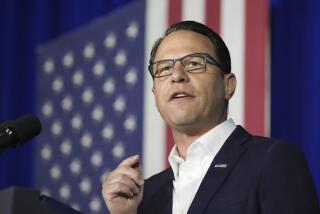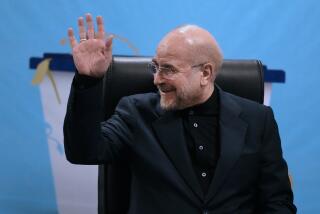Peres Balloting Seen as Barometer for Barak
- Share via
JERUSALEM — Election to the largely ceremonial post of president of Israel ought to be a walk in the park for someone with the stature of Nobel laureate Shimon Peres.
No single Israeli political figure is as well known internationally, and few Israelis have a resume as steeped in national history and service.
But Peres has not taken victory in today’s election for granted. He spent the brief but intense campaign glad-handing at receptions, buttonholing members of parliament whose votes he needs and courting the powerful rabbis who undoubtedly will influence the election outcome.
If Peres loses to his opponent, lesser-known legislator Moshe Katzav of the right-wing Likud Party, the defeat will reflect disaffection with Prime Minister Ehud Barak and his efforts to make peace, a process that Peres helped launch with the landmark Oslo accords seven years ago. The presidential vote is being seen as a barometer for Barak’s already fragile government after the prime minister’s willingness to make significant territorial concessions to Palestinians in the just-concluded Camp David summit outraged the right and threatened Barak’s own political survival.
In another blow to Barak, his estranged foreign minister, David Levy, announced Sunday that he will join the exodus from Barak’s Cabinet and quit Wednesday. But a vote later today to censure Barak and possibly bring down what’s left of his government seemed to lose steam and might not succeed.
The presidential election takes place in the parliament, or Knesset, with its 120 members casting secret ballots to choose between Peres, of Barak’s One Israel Party, and Katzav.
Other factors, beyond passing judgment on Barak, will also be decisive in the race. The support of the ultra-Orthodox Shas Party is key. Both Peres and Katzav have courted Shas, paying reverent visits to Rabbi Ovadia Yosef, the party’s turbaned spiritual leader, who can tell his men in the Knesset how to vote.
Shas holds 17 seats in the Knesset and can provide the margin of victory. Peres’ party holds 26 seats, Katzav’s 19. Shas is in many ways a more natural constituency for Katzav because he, like many of Shas’ members, is an observant Jew of Sephardic, or Middle Eastern, ethnic background. The Polish-born Peres is of Ashkenazi heritage and much more secular. But he has a long-standing, friendly relationship with Yosef, and Shas tends to favor front-runners.
For Peres, 76, serving as Israel’s eighth president would mark a significant personal redemption, the final crowning moment of a political career that has spanned the existence of the Jewish state but that has never earned him great affection at home.
Never able to lead his party to victory, Peres became unshakably saddled with a reputation as a loser after he was unexpectedly defeated by right-wing candidate Benjamin Netanyahu in the 1996 race for prime minister. Peres was the hands-down favorite and the incumbent, having stepped in to replace the assassinated Yitzhak Rabin.
Several months later, Peres was unceremoniously dumped from the leadership of the Labor Party (now renamed the One Israel Party), a move engineered by Barak, a rising star who had never gotten along with the elder statesman.
Mindful of Peres’ reputation as a meddler, Barak further marginalized the 41-year Knesset veteran by offering him a meaningless Cabinet post in the current government, effectively removing him from any potential involvement with peace negotiations.
Like many of Israel’s foremost leaders, Peres began his public life as a pro-military, security-conscious hawk who later became the consummate advocate of peace. He is credited with establishing the country’s secretive nuclear arms program and building its aviation industry. He served in successive government posts, becoming prime minister three times and then, in the 1990s, steered Israel into the historic pursuit of peace with its Arab enemies.
In 1994, Peres shared the Nobel Peace Prize with Rabin and Palestinian leader Yasser Arafat.
The overtures that Peres made to the Palestinians at the time seemed revolutionary and earned him the enmity of many conservative Israelis. And, in contrast to the esteem the world seemed to hold him in, Peres has often alienated many Israelis who disliked his pompous airs and flowery speech. But these days, public opinion polls show Peres with a remarkable approval rating of between 60% and 70%.
In the weeks leading up to today’s election, Peres has been careful to avoid speaking of peace and of the failed Camp David summit, preferring instead to cast himself as a figure who can unify the divided nation and promising to stay above the national political fray.
“I will deal mainly in unifying the nation,” Peres told a recent gathering of One Israel, where Barak begrudgingly lent his support. “Some say I am controversial. I am sorry about that. Building the atomic reactor and the aviation industries were indeed controversial. The peace process also required controversial decisions, but national unity will contribute both to security and to peace.”
The Iranian-born Katzav, 55, is also promising to repair the religious and political divisions tearing at Israeli society and to be “president for the whole nation.”
He has sought to portray Peres as an elitist favored by the liberal Israeli press and has cast himself as an immigrant underdog who is devoted to the Jewish faith and who will avoid controversy. He is a “kid from the maabarot,” he says, referring to the slums where Sephardic immigrants were herded in the 1950s, a practice that generated undying resentment among that community toward the Ashkenazi rulers.
The election is being held three years ahead of schedule to replace Ezer Weizman, who was forced to step down after a financial scandal in which he admitted receiving hundreds of thousands of dollars from a French tycoon.
More to Read
Sign up for Essential California
The most important California stories and recommendations in your inbox every morning.
You may occasionally receive promotional content from the Los Angeles Times.














